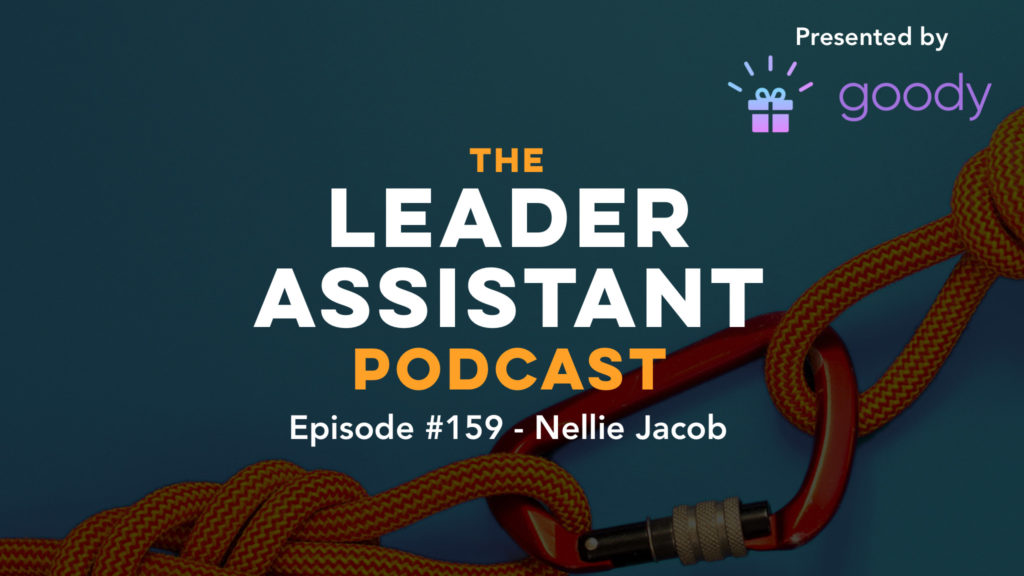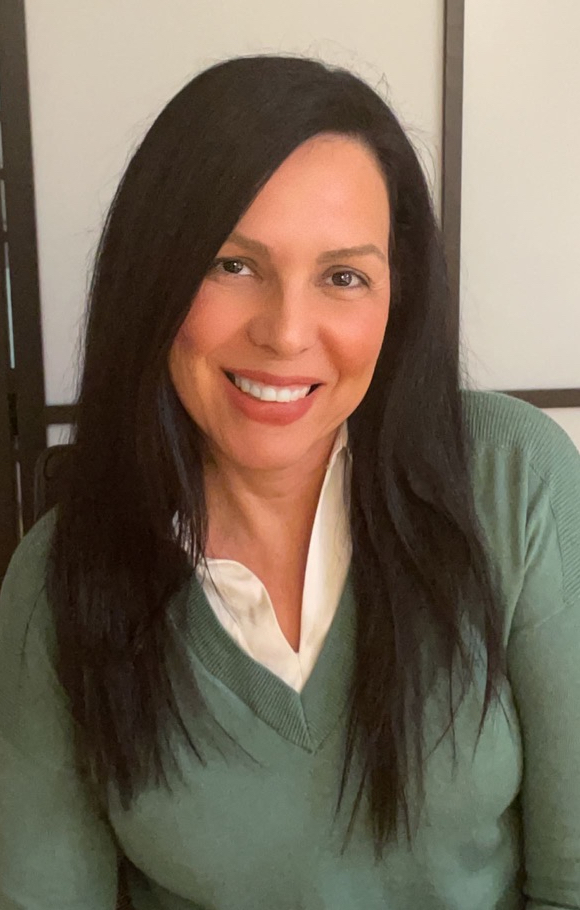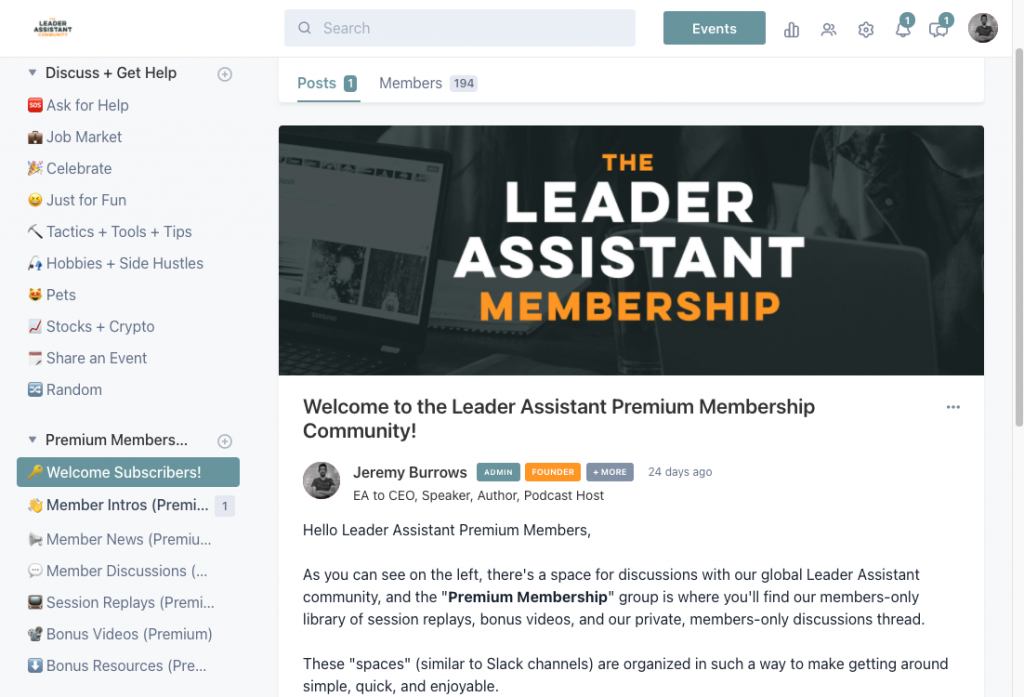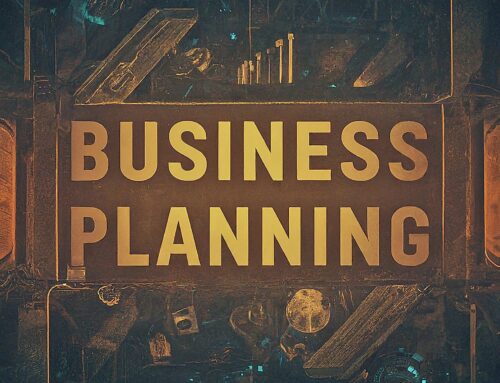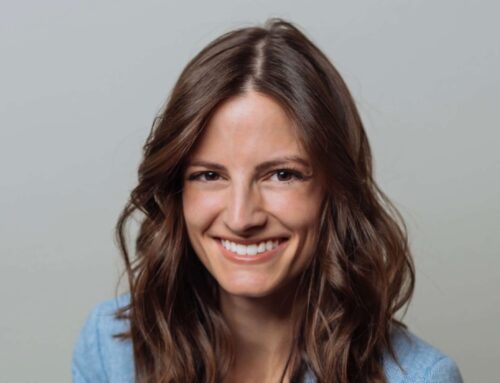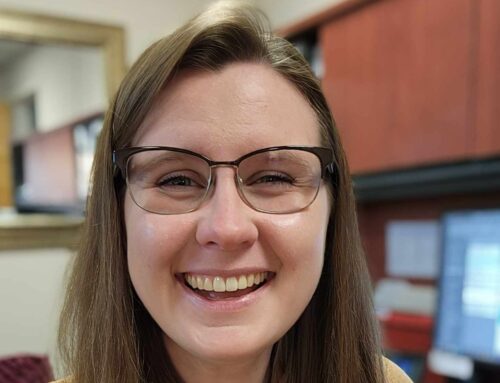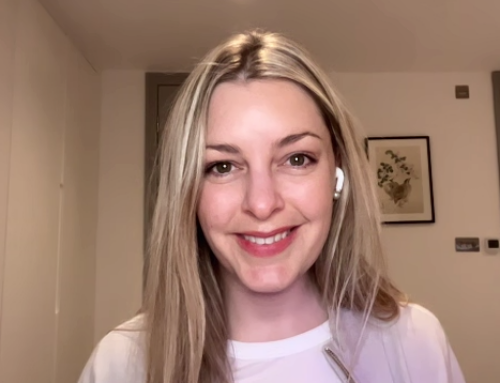Nellie Jacob is a certified Strengthsfinder coach and longtime executive assistant in Toronto, Canada.
In this episode, Nellie talks about the evolution of the role, how to take the pulse of your executive, organization and team, leading with empathy, and becoming aware of your strengths. Enjoy the conversation and don’t forget to checkout the Assistants LEAD animation video here.
LEADERSHIP QUOTE
Leadership is about empathy. It is about having the ability to relate and connect with people for the purpose of inspiring and empowering their lives.
– Oprah Winfrey
CONNECT WITH NELLIE
ABOUT NELLIE
As a first generation Canadian, and the oldest of 3 children. Nellie was raised by a highly organized mother, and hardworking father. She was the second mom to her siblings, the nurturer, mentor, the planner and the go to for her parents when it came to translating at appointments and dealing with things that arrived in the mail. She loved reading, collected National Geographic magazines, and absorbed information about everything at a rate that made it difficult to keep up with if you didn’t like learning.
Her childhood was the practice ground for what would shape her professional career.
Whether at school, at home, with friends, she was the organizer, the nurturer, the relationship builder, the negotiator, the one looking ahead, while high functioning in the here in now. The one inspiring and encouraging, the one helping make connections to thoughts, actions, plans, people, with purpose and intention. The empathic, motivating, goal setting, we can do it together while making a difference, leader. Her first job as a receptionist became the stepping stone to becoming an Admin Assistant, a Program Manager, an Event Manager, and over a decade as an Executive Assistant to C-Suite leaders.
She became a certified GALLUP Strengthsfinder coach in 2016, and that is when everything changed. Becoming aware and directing her talents and strengths with purpose enabled her to live from a place of clarity. Living from a place of recognizing and embracing strengths empowered her to separate unconscious bias from truth. Her own and those belonging to others.
This empowered her to leave a role where leadership opportunities were not available, today she is the Executive Assistant and President’s Office Manager, where she uses her relationship building, strategic, influencer and execution talents to equip others for success. She also coaches woman and individuals struggling to make progress in their personal life or in roles where their talents and strengths are not seen or being utilized.
THE LEADER ASSISTANT PODCAST IS PRESENTED BY GOODY
A special thanks to my sponsor, Goody!
If you send business gifts to employees, clients or sales prospects, Goody is a game changer. You can send one gift or hundreds at the same time, without ever worrying about shipping details. With Goody, your gift recipients provide all their shipping info, and they can even swap out your gift for another option if they prefer. It’s free to start gifting and you get a $20 credit when you sign up. Oh and if you mention you heard about Goody on The Leader Assistant Podcast, Goody will add an extra $10 credit to your account.
Go here to start gifting today!
THE LEADER ASSISTANT PREMIUM MEMBERSHIP
To learn more about how you can join the now 200+ growth-minded Leader Assistants, check out our Leader Assistant Premium Membership for ongoing training, coaching, and community.
THE LEADER ASSISTANT BOOK
Download the first 3 chapters of The Leader Assistant: Four Pillars of Game-Changing Assistant for FREE here or buy it on Amazon or Audible.
LEADER ASSISTANT LIVE EVENTS
Check out our constantly updated schedule of events for admins and assistants at LeaderAssistantLive.com. Including our all-day, online leadership workshop at leaderassistantlive.com/workshop.
JOIN THE FREE COMMUNITY
Join the Leader Assistant Global Community here, or the Facebook Group here for bonus content and to network with other assistants who are committed to becoming leaders!
SUBSCRIBE
Subscribe to The Leader Assistant Podcast so you don’t miss new episodes!
You can find the show on Apple Podcasts, Spotify, Google Podcasts, Pandora, and Stitcher.
Join my email list here if you want to get an email when a new episode goes live.
LEAVE A REVIEW
If you’re enjoying the podcast, please take 2 minutes to rate and review the show on Apple Podcasts here. Each review helps me stay motivated to keep the show going!
—
EPISODE TRANSCRIPT
Nellie Jacob 0:00
Hi, my name is Nellie Jacob, and today’s quote is from Oprah Winfrey and its leadership is about empathy. It is about having the ability to relate and connect with people for the purpose of inspiring and empowering their lives.
Podcast Intro 0:18
The Leader Assistant Podcast exists to encourage and challenge assistants to become confident game changing leader assistants.
Jeremy Burrows 0:29
The Leader Assistant Podcast is brought to you by goody if you send business gifts to employees, clients or sales prospects, goodie is a game changer. You can send one gift or hundreds at a time without ever worrying about shipping details. With goody your gift recipients provide all their shipping info. And they can even swap out your gift for another option if they prefer. It’s free to start gifting and you can get a $20 credit when you sign up. Oh, and if you mentioned you heard about goody from The Leader, Assistant Podcast, goody, we’ll add an extra $10 credit to your account. So go to leaderassistant.com/goody. That’s g o o d y to start gifting today. Again, that’s leaderassistant.com/goody. Hey friends, thanks for tuning in to The Leader Assistant Podcast your host Jeremy Burrows and welcome to episode 159. You can check out the show notes and stream this episode or share this episode with others by going to leaderassistant.com/159 Leaderassistant.com/159. And today I am speaking with Nellie Jacob, and Nellie is in Toronto Canada. Nellie how’s it going?
Nellie Jacob 2:01
It’s going great Jeremy, thanks for having me on.
Jeremy Burrows 2:04
Yeah, I’m excited. So I posted a video the other day, the call it the assistance lead animation video posted on LinkedIn, LinkedIn, and you commented on it and then shared it and I thought you had some really good insight when you shared it. And that’s kind of how we connected and I said, Hey, be on the show. Or maybe you said hey, can I be on the show? I can’t remember which one. But I’m excited to be talking with you and love to talk with assistance from all over the world and with different experiences. So tell us kind of a little bit about your story. Where did you grow up? And how did you end up becoming an assistant?
Nellie Jacob 2:53
Well, I grew up in Toronto spent my whole life in Toronto, and I was actually a first generation Canadian and grew up with immigrant parents. They didn’t speak English very well. So I ended up as the oldest in the family becoming the translator becoming the person that was the go to for a lot of things at home. And what I realized later on in life, it was really the practice ground. I think for me building up a lot of my own skills and those skills ended up leading me to getting a job as a receptionist in telecommunications company here in Toronto. And it wasn’t long after I started in that role. I think it was six months after I started as the receptionist, an opportunity came up to become an assistant and admin assistants and I quickly jumped on it just read a job description and I thought, oh my gosh, this is all the stuff that I do at home for my parents just keep them organized. And really kind of direct things and keep a whole team kind of organized and scheduled. So it instantly attracted me to the job description. And so I jumped on it and I got the job. And I really, really enjoyed it. I worked with a number of directors. And from there, I actually ended up providing regular backup support to the executive floor. I had the opportunity actually to work for the executive floor, but it was in downtown Toronto and I was sort of in the in the suburbs, and wasn’t interested at the time in going down there full time and actually quite enjoyed supporting different executives, you know, across all departments. So use that to really build up my skills as well in terms of becoming pretty versatile across the organization and recognizing people in all departments. So it was from there then that I went on to become a program manager for a pretty large I’m not for profits, and became a program manager and then an event manager left that after I had kids and then went back to becoming an executive assistant for the CEO of another, not for profits, and worked there for 10 years supporting the CEO and the CFO and working with boards. And then actually, in the last couple of years, I ventured off and tries to start my own business. Because I had become a certified strengths coach, I impacted the way that I operated as an executive assistant so much, that it really helped me to recognize that the leadership skills that I had, were not being tapped into and where I was, there really wasn’t any room for growth and opportunity to go into a leadership role. So I left and kind of took a leap of faith and did some coaching for a while and, but actively looked for the right role. And that’s where it led me to where I am now where I’m the office manager to the president of the organization where I’m supporting now. And it’s it’s fantastic. You know, I have a few people reporting to me, I’m still able to do a lot of the assistant things that are related to calendars and strategy and helping the senior team stay on track with things. So it’s, it’s really aligned with my skills, my talents, my strengths, and it’s a role that I really enjoy.
Jeremy Burrows 6:30
Could you tell us a little bit more about your current role? So on your LinkedIn, it says executive assistant slash office manager, and he said, you do have a couple of people reporting to you. Yeah, well, tell us a little bit more. Is it Tecton Techtronic? Is that right? Tektronix.
Nellie Jacob 6:45
Electronics Industry, it is actually an umbrella company for a number of well known brands like Milwaukee Tools, and Dirt Devil. There’s a number of there’s a lot of quite a few lines that we carry in terms of tools and homecare products. I added the executive assistant in the in the respect that I helped the president with the day to day function has calendaring, travel, that type of thing. But there is a big piece of it, where I help run the office. So whether it be the overall management of all of the facilities, I have the receptionist reporting into me, and then her backup, which takes care of all the mailroom, and then I have an assistant that takes care primarily of all of our company events. So there’s, there’s a little bit of a little bit of everything in there. And that is, what makes it really attractive is the fact that it’s not just the administrative side, there’s a lot of leadership and a lot of helping other people also do their jobs well and helping them to become empowered in their roles.
Jeremy Burrows 7:55
Great. So the video that I shared talks about has kind of this two, two characters. And for those of you listening that haven’t seen the video, you can go to assistance lead.com and watch the 37 second animation video that I’m talking about sistance lead.com, and I’ll put it in the show notes as well. But the video that talks, basically has two characters, and they’re walking in a park and one of them says, Hey, what do you do? And the other one says, I’m an assistant, and so person who asked what do they do? So Oh, so you make coffee, or you get coffee and make copies? And you know, it’s kind of a funny, like, you know, SMH are shaking my head, Thought Bubble. And it’s like, actually, I do much more. And I intentionally said, I do much more versus saying no, that’s not what I do. Because I believe that getting cocky and making copies can totally be part of your job. And that’s, that’s totally fine. You shouldn’t be above doing that. But your post, you know, you shared the video and you said the evolution of the role. Talk about a little bit about when you first your first couple years as an assistant back in the day. And then now like what are some of the highlights of how you’ve seen the role of an assistant evolve?
Nellie Jacob 9:21
Yeah, I’ll definitely well without dating myself. I’ve been in this for a minute. Um, so when I first started in this, let’s just say the internet was probably just starting. And before we we rapidly used emails, we used fax machines and and intercompany mail and that type of thing. So it was a completely different way of operating it and that’s what I loved about your video. It really gave the rule, a voice when you think about it, like it really gave it a voice in terms of saying, Yeah, you know what I, there are days where I might be helping someone get coffee together for a meeting. And that’s okay, if that’s what if that’s what we need that day. But it’s so much more than that. And the roll really is so different from organization to organization, and even within the organization, depending who you’re supporting. But it really has the real difference is where it came from and to what it is now. And back in the day, it was, it was primarily supporting a lot of males that were in leadership, I probably remember over my course of supporting people, at least over the last 20 years 80% of the senior level leaders that I supported were males. And when you’re talking back in the 80s, it was an entirely different kind of expectation and having the background that I had growing up an immigrants daughter from Europe, our household had, you know, like a lot of European households, girls were a lot of poor households expected those girls to have different roles than boys. So having taken care of my family, and being a bit nurturing by nature, really put me into a position in that role where it really served me. And by serving me, I was able to serve others, if you think about it, and making coffee and getting meetings ready and catering food, and that type of thing was very, very much part of it. But that was the primarily what it was. And there really wasn’t an opportunity to get involved with any decision making or any leadership of staff, it really was a support role. And over the last few decades, I’ve seen a great shift take place, as I think younger people have come into it and really changed it as well in terms of what they’re bringing into it. And as well, I think more women coming into it. And I think men as well, like even just men as well, like are recognizing that the role itself has an opportunity to tap into talent that hasn’t been done before in the past. So executives are now seeing their executive assistants or their admin assistants as individuals that are almost like their right hand in terms of keeping a pulse on what’s going on in the office and extension of what they’re doing with their senior leadership team. And, you know, there’s there’s been times where I’ve helped the senior leader with KPIs and with performance indicators, and getting their senior team to get them in and discussing them and updating them and going through them. And that’s something that would have never happened 25 years ago. So it really has evolved. It’s very much a strategic role. Now. It’s very much, especially when you tap into the specific strengths that individuals have, and you recognize what your assistant strengths are, you really recognize that you can utilize them differently than you then that role has been utilized in the past.
Jeremy Burrows 13:46
Yeah, well said. So what what would you say? The next 10 to 15 years are going to look like how’s it how’s the role going to evolve even more over the next 10 years?
Nellie Jacob 14:00
Well, I’m not what I’m already seeing. And a lot of and to be honest, I’m really happy with with what I’m seeing is a lot of executive assistant roles are now being changed into or morphed in some way or form into a chief of staff role. And I mean, traditionally chief of staff was a role that was more in line with politics, where, you know, they helped a political candidate, and it was more of a strategic role in that in that regard. And now I see that that’s happening more and more in business as well. So the assistant is now attending those meetings and having a voice and really contributing to what’s going on in terms of the planning and directing and keeping the senior leadership team really it’s an extension of the senior leadership team are very much a part like that’s where I’m kind of see and move towards because we all know like the workloads have become crazy. And senior leaders have more than more meetings that than they have time. Right? So there’s so much time being spent in meetings, that there’s less and less time to actually get the work done. So what I’m seeing is the chief of staff is becoming the middle person between the senior leader and the CEO, where they’re committed, it’s almost like a director role where they are helping them, you know, take those things that they don’t have time for, and really moving it to the next level, and becoming that connection piece. So it really is exciting and exciting time to be in this type of industry.
Jeremy Burrows 15:47
Yeah, what’s one tip you would have for the assistants listening who are like, I want to do that I want to be, for example, better at taking the pulse of the organization and the team and an executive leadership team. What’s what’s a practical tip that you’ve used in your career to? Yeah, take the pulse of the organization?
Nellie Jacob 16:13
No, there’s just there’s so much that I mean, there’s a number of things that they can do. If if the person that you’re supporting, if you see that they are open to ideas, and then your thoughts and really listen to what you have to say in terms of valuing your input, then maybe just have a conversation with them. And just let them know that you know, you would love to get more involved. I’ve done that several times, with leaders in the past where I’ve said, you know, I want to get more involved at another level, or I need more to keep me more, more engaged. So depending on who you’re supporting, that may be a place that you can start with, if if you do want to go into more of a chief of staff role, and there’s an opportunity for that within your organization, or maybe even outside of your organization, find someone who can be a mentor to you, and work with someone who is going to help you to operate out of that place along the way, and give you some guidance. And don’t be afraid, like, Don’t be afraid. One of the greatest things that I did myself was for myself, and I’m not telling everybody else to do this, it was becoming a coach, because I had the coaching ability, and was a leader. And I recognized that I could help others through coaching and the the organization that I worked for, saw that as well. And although they didn’t have a leadership opportunity for me, specifically, they incorporated the court the coaching as part of my executive assistant role. So what does that look like, that looks like taking the whole senior leadership exec assistant team, and working with them and leading them and doing some coaching with them. And next level down working with the admin assistants and doing some coaching there. And providing some leadership at that level. And for me, that was life changing, because it really helped me recognize that those leadership skills were there, and I wanted to use them more. And the organization that I was in, didn’t have that ability to move me up into another role. So I took a leap of faith and, you know, took some steps to making that happen outside of that organization. And, and that’s what led me to where I am now.
Jeremy Burrows 18:52
Alright, so tell us a little bit more about the strengths coach, element. I know. Strengths, finders is a resource, a book that’s been around for a while, and I’ve gone through it in prior organizations, a few different times. Very helpful tool. Very helpful resource. Even just going through the reading the book and going through the exercises in the book was helpful. But tell us a little bit about your coaching. And what does that mean for you to? You know, even just like you said, with the EA team, your coaching, coaching the EA team? How does that look? How does that look? And how can maybe others who would like to do similar things with their teams? How can they do that and to help empower and coach their teams?
Nellie Jacob 19:44
Well, it’s, I mean, when once you do the assessment and you get your reports, you you do your 100 questions, you answer it and you get your report and it tells you what your strengths are and you can get a report where it tells you your top five or you can get a report where it gives you all 34 of of your strengths. And the first step is really recognizing what your strengths are. And when once you get it on a report, you can have a bunch of warrants that say you’re you know, you have this strength and you have this strength, you have the strength. And that’s just the first step. What people often do is they look at that record, and then they kind of read over it understand a little bit, and then they stopped there. But what really, really makes a change is when you take that report, and then you meet with the coach, and you really unpack those strengths and what they are, what are your talents? And how are you using them? Or how can you use them more perfect example for me, one of my strengths is called input. And input is basically a sponge, it’s an information hoarder. So I am really, really good at gathering information really, really quickly. And so the input will be the person while people are having conversation, they’re Googling the information. And before they finish the information, the talk that they’re having, you already have data for them. So being that person, the information gatherer, every person that I meet, every interaction that I have, I am gathering information from, from those interactions, and I’m storing them. So that when I need that information at any point, and I mean, it can be a personal conversation, a professional conversation, it can be an article I’m reading, that storing of information comes out anytime, anyplace. And it is very, very helpful. When you are either creating strategies to move forward. It’s, it’s great when you’re doing research, and you have to gather information for a decision that you have to make or an event that you’re writing. All that stuff comes out. So when I recognize that I was really good at gathering information, it changed the way I did my job. Because when I was doing my coaching, when I was being coached with a coach, they helped me to see all the times where I was naturally doing it. But I wasn’t really doing it to the full potential that I could. And once we realize, once we unpacked why that was happening, it really created an opportunity for me to use it more. And so as I started to recognize all the all the times where I could implement it, and where how I can use it and how I can apply it, it started to happen more naturally. And I even started to volunteer my time, or my expertise. And I would openly say, Well, I’m really good at gathering information, I can do that. You know, give that one to me, I’ll take it. And then people started to recognize me for it, and then they would come to me for it. So it really I mean, that’s just one specific example. But every time you tap into a talent and one of your strengths, it just unlocked something. And when you do that with a team of people, and you have a session where everyone is speaking and learning about their strengths together, it really creates an understanding of oh, that’s why oh, that’s why they do that. Or, you know, it really does create a different understanding of I’ve had teams where they just did not click, like teams that have had turnarounds a turnaround, like the turnaround run was really, really high. And we couldn’t get people to stay there. And then we did a session and having those people understand how they operate, what their strengths are. And we posted their strengths. I mean, this was before COVID. So everyone had their strengths at their desk. And then on a team site, we posted everyone’s strengths. So at any given time, you can go see someone else’s strengths or your own. And so if you were struggling with understanding why someone was doing something or not doing something, you can go to look at their strengths and see, okay, why is it? You know, why is it that I’m using my communication, but it’s not landing. And then once everyone starts to understand their strengths, they come at it from a different place. They don’t see the challenge of, you know, being difficulty or an obstacle, they see the strength as Okay, so how can we utilize the strengths that are on here differently? Yeah, it changes everything.
Jeremy Burrows 24:45
Yeah, I’ve seen it before to where, you know, you’ll see, you’ll see a team that’s struggling or there’s obviously room to grow with with a certain team and, you know, you do these assessments and you realize that oh, that’s because everyone has the same strength. And yes, we’re missing. There’s a big gap. Yep. These other strengths and maybe when next time we hire someone, you should consider this. Yeah.
Nellie Jacob 25:10
Well, I mean, I’ve even had really great leaders. And I mean, a sign of a great leader, one of one of many signs is recognizing when, you know, you don’t have a strength that the team needs needs. So who on your team might have that strength? Who will you empower on your team to do that part, and you can provide that as an area of development, perhaps, if they’re interested to take on that part. And and, you know, just because you’re a leader doesn’t mean you have to do it all. You a great leader recognizes who they have on their team and uses their strengths. So that’s, that’s where it has really been very helpful.
Jeremy Burrows 25:51
Great. Well, let’s, let’s talk about empathy. I don’t know, particularly if that is explicitly one of the strengths on the strengths finders, but it is actually I was trying to, you know, I was actually looking on my computer to try to find my old Strengths Finder results, I haven’t saved somewhere, but I couldn’t find him at first glance. But, you know, having the ability to relate with people and be empathetic with people talk about how leading with empathy is not a weakness, but a strength. And maybe there’s a couple of practical tips that you can share on how to be more empathetic. Because I know a lot of times, you know, myself included, as assistants, we’re like, let’s just get this stuff done. And, like, check the check the next next task off of our to do list. Yeah. And just put your head down and crank out the work. And, you know, I’ve been accused of being emotionally dead inside. In the past. And, you know, I haven’t been the most empathetic assistant, but what, how would you encourage those listening in encouraged me to be more empathetic?
Nellie Jacob 27:16
Um, yeah, empathy is, I mean, it’s something that has really come, it’s come out of COVID. In a different way. Empathetic leadership, I think has become more important than ever coming out of the last couple years. And it is an opportunity to look at the people that you are working with, whether they report to you or whether you’re just working with them and collaborating with them. And to see the person. It’s, it’s really saying, I see you. It’s saying, I hear you. And depending on the situation, it’s, you know, when you’re working with someone where they may report to you, and you see that they’re struggling with something, and if they can, if they open up to you, it’s sometimes it’s saying I understand, or maybe I don’t know what you’re feeling, but I am hearing what you’re saying. It does take a level of slowing down sometimes. And for someone, when I first got into yoga, I didn’t, I couldn’t do it, I could not do it. Because I am so like you said, Jeremy, you’re an assistant and you’re like, go, go, go go next house, that’s next house. Next thing on your list. So slowing down, in a yoga class created a tremendous amount of anxiety for me. And it took probably five or six tries over a period of a year, maybe a few more, to finally get to a place where I could slow down enough in a class where I wasn’t, I didn’t feel like I just wanted to get up and running. Because I just felt like, you know, like, I can’t do this. It’s just too slow. And it took work, like it did not happen the first class and it didn’t happen. And even by my sixth or seventh class, I wasn’t completely there yet, I would say it took a good, you know, two dozen classes before I could finally get to a place where I was comfortable enough to take a breath. And for me, it really was almost a breeding ground for slowing down. And it helped me to do that in a way where it actually made me better at my job. Because in the roles that we’re in, sometimes we think faster, faster, faster. Next thing get it off the checklist deadline, get this out, clear out the inbox is the successful way of doing it. Right. But sometimes successful doesn’t always mean that sometimes successful means actually going a little bit slower so that you can get further and yeah, for me that was Is that was big in terms of recognizing that by slowing down, I can see people. And when I saw people and I was hearing them, I was better able to empathize with them. Yeah, so it really is. And it really creates a connection between you and the person in terms of being able to move forward from a different place. And I’ve had, I’ve been really lucky to have leaders that I’ve supported who I was able to learn that from. I mean, every experience is a learning experience. And I’ve had leaders that did not have it, and I’ve had leaders that have. So by by having something to compare one thing to another really helps me to understand where the empathy works. And it inspired me to want to leave like that. And so, you know, just listening and, and telling people, you know, I, if it’s someone that reports to you, if you do have people that reporting into you, it’s, it’s just saying, you know, I see you’re struggling, or I is there is everything, okay? And if they do open up to you, it’s just saying, you know, I hear what you’re saying, and I’m really sorry. And I can’t imagine what you’re feeling. But let’s see what we can do to help you. And having had that done to me, during periods of my life, just wanted me to do better for them, like having their understanding, created a place of having a great, so much gratitude for that understanding that I wanted to say thank you through my supporting them even more. It was it was how I said my thanks. And as I’ve had an opportunity now to lead others and and I use empathy through my own leadership style, I see it in the way that others respond as well, to me, and it really is, it’s kindness, inaction, that’s what it is. But it does take a level of slowing down to make it happen.
Jeremy Burrows 32:16
Awesome, well said well said. Well, Mellie, thank you so much for being on the show and sharing a lot of insight. It’s been really, really valuable. I’m excited to share this with the world. Before we wrap up, though, what’s one thing that you would tell a brand new assistant who’s about to start on Monday, their first assistant job was something that you would encourage them to do in their first week.
Nellie Jacob 32:49
Be kind to yourself, be kind to yourself, because a lot of assistants that I have interacted with over the years, whether it’s an admin assistant, and executive assistant, so many of them, I mean, a lot of people want to do a good job no matter what job you’re in. But there’s just a level of responsibility and achievement that comes with an assistant and in terms of going through those checklists. And it puts a lot of you put a lot of pressure on yourself to do well to perform well, to support well, to. And when you’re into that first week on the job. There’s a lot of information coming at you. I mean, you are learning names, you are learning acronyms, you’re learning lines of businesses, there’s just so much coming at you. Just take your time to learn as much as you can. But be kind to yourself during that process. And always be open to learning and to evolving yourself as a person. With with, with being kind to yourself and being in a place of continuous learning. You will go far.
Jeremy Burrows 34:02
Love it. Nice, good way to end the episode. Nellie, how can people reach out to you if they want to say hi or connect? And yeah, get to know you more?
Nellie Jacob 34:14
Yeah, I’m on LinkedIn. Nellie Jacob on LinkedIn, they’re more than welcome to reach out.
Jeremy Burrows 34:20
Perfect. I’ll put that link in the show notes so people can find you easily. And yeah, thanks again for being on the show. Thanks for sharing the animation video. And thank you for leading well leading yourself well and leading others well. I’m gonna have to probably dig up my strengths finders report and send it to you once I find it.
Nellie Jacob 34:43
Sounds good. I’ll be waiting for it.
Jeremy Burrows 34:46
Awesome. Thanks so much, Nellie.
Nellie Jacob 34:48
Have a great day. Thanks for having me.
Podcast Outro 34:59
pleased to have you on Apple podcasts goburrows.com

